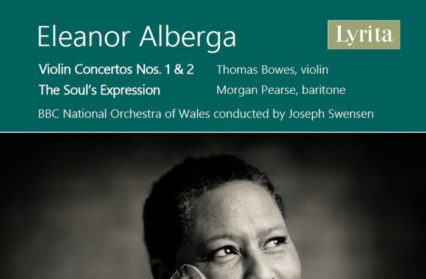David Truslove reviews Eleanor Alberga: Violin Concertos Nos. 1 & 2 and The Soul’s Expression, the latest collection from Lyrita featuring the BBC National Orchestra of Wales.
I have previously commented on the recording activities of the BBC National Orchestra of Wales in respect of its on-going survey of lesser-known composers. Forays into the music of John Mayer, the Israeli Paul Ben-Haim and the highly gifted Ruth Gipps have all shone a light on their creative endeavour. As one of the few orchestras in the UK to winkle out the work of unfamiliar composers who might otherwise remain undiscovered, Lyrita has recently curated a disc showcasing the work of Jamaican-born composer Eleanor Alberga. After moving to the UK in 1970, when she took up a place at the Royal Academy of Music to study piano and singing, her creative energies developed after she joined the London Contemporary Dance Theatre. Composition eventually erased earlier ambitions as a pianist and from 2001 she pursued writing full time. Works for stage and film followed, along with instrumental, chamber and orchestral pieces, many of which owe a debt, she claims, to her Caribbean background and to 20th century European music in general. In the disc’s booklet notes she names Bela Bartók as a special influence, but one might suggest others stretching from Karol Szymanowski to Hans Werner Henze and beyond. She prefers listeners not to hear any so-called ‘identities’ and has declared ‘My wish is that they hear good music that communicates something human to them’.
This is now the third recording devoted exclusively to her music and the first to be performed by the BBC NOW under guest conductor Joseph Swensen. Recorded in February 2021, the disc showcases Alberga’s two violin concertos, both performed with stunning virtuosity by Thomas Bowes, and a work for baritone and string orchestra, persuasively sung by Australian Morgan Pearse, entitled The Soul’s Expression. The work was premiered in 2017 at Aberystwyth Arts Centre by Jeremy Huw Williams and the Welsh Chamber Orchestra and sets words by a trio of 19th century female writers: George Eliot, Emily Brontë and Elizabeth Barrett Browning, of whom the latter grew up in Jamaica. Alberga chooses poems that explore different aspects of the soul’s perceptions, setting four texts within a through-composed framework lasting 17 minutes. A darkly pithy quotation from George Eliot’s Adam Bede links each poem and provides a foil to the rapture within ‘Blue Wings’ and hope in ’Roses’. Languor occupies Brontë’s ‘The Sun Has Set’, while unanswered questions on the mystery of the soul posed by Barrett Browning conclude a work marked by a romantic sensibility and richly variegated string textures. To this last feature the string section of the BBC NOW respond with incisive playing, both crisp and warm and unfailingly sensitive to Morgan Pearse’s bronzed baritone. Balance is finely judged too by Swensen who brings scrupulous attention to detail.
In 2020 he conducted the premiere of Eleanor Alberga’s Violin Concerto No. 2, ‘Narcissus’, with which this disc opens. Written for modest forces (a handful of woodwinds, single trumpet, timpani, percussion with harp, piano and strings), it too reveals a romantic receptivity within its three linked movements and draws inspiration from the Greek myth of the title who falls in love with his own reflection. One can enjoy the work without an appreciation of its stimulus, but Alberga wished ‘to catch the spirit of the original, with certain moments that listeners might identify along the way’. That said, the rhapsodic first section beguiles with shimmering string sonorities, gentle murmurs from wind and tuned percussion, above which Bowes’s sweet violin soars as if admiring its own beauty. A slightly faster passage of increasing agitation, initiated by a march (echoes of Prokofiev?), inhabits a profusion of restless ideas that eventually dissolve in the closing paragraph. Seemingly tamed, the soloist brings reminiscences of earlier pirouetting, with Bowes’s violin now ‘weeping’ alongside sympathetic gestures from piano, timpani and muted trumpet before surrendering into a deathly silence.
Playing with no less energy and commitment gilds Eleanor Alberga’s more expansive Violin Concerto No. 1. Conceived in 2001 and scored for chamber forces, but with a key role for piano, the work is a tribute to happy times the composer spent with her husband, Thomas Bowes, when they performed as a duo. It’s a work of gritty intensity and rumination, both clangourous and playful, even incorporating a blues episode in the opening ‘Moderato’, where accumulating excitement is crowned by thunderous timpani. An elegiac slow movement follows, subtitled ‘Requiem pour une maison’ (referencing an unfulfilled vision to purchase a house in Southern France), much occupied by wispy solo writing over shadowy strings, the whole eerily detached. Not so the ‘Allegro’ finale, a rustic dance (evoking Bartók) enclosing a glowing central cadenza, dreamy and reflective, but closing in the spirited manner the movement began. If there is an excess of ideas, there is no doubting playing of undeniable commitment and vigour from Bowes and the BBC NOW. It’s a rewarding disc, with excellent sound, that repays attention.
You may also like…
Arion: Voyage of a Slavic Soul by Natalya Romaniw: David Truslove explores a debut recital album that is a deeply personal celebration of Slavic song.
David Truslove is a critic and regular contributor to Wales Arts Review.
The Soul’s Expression The Soul’s Expression











